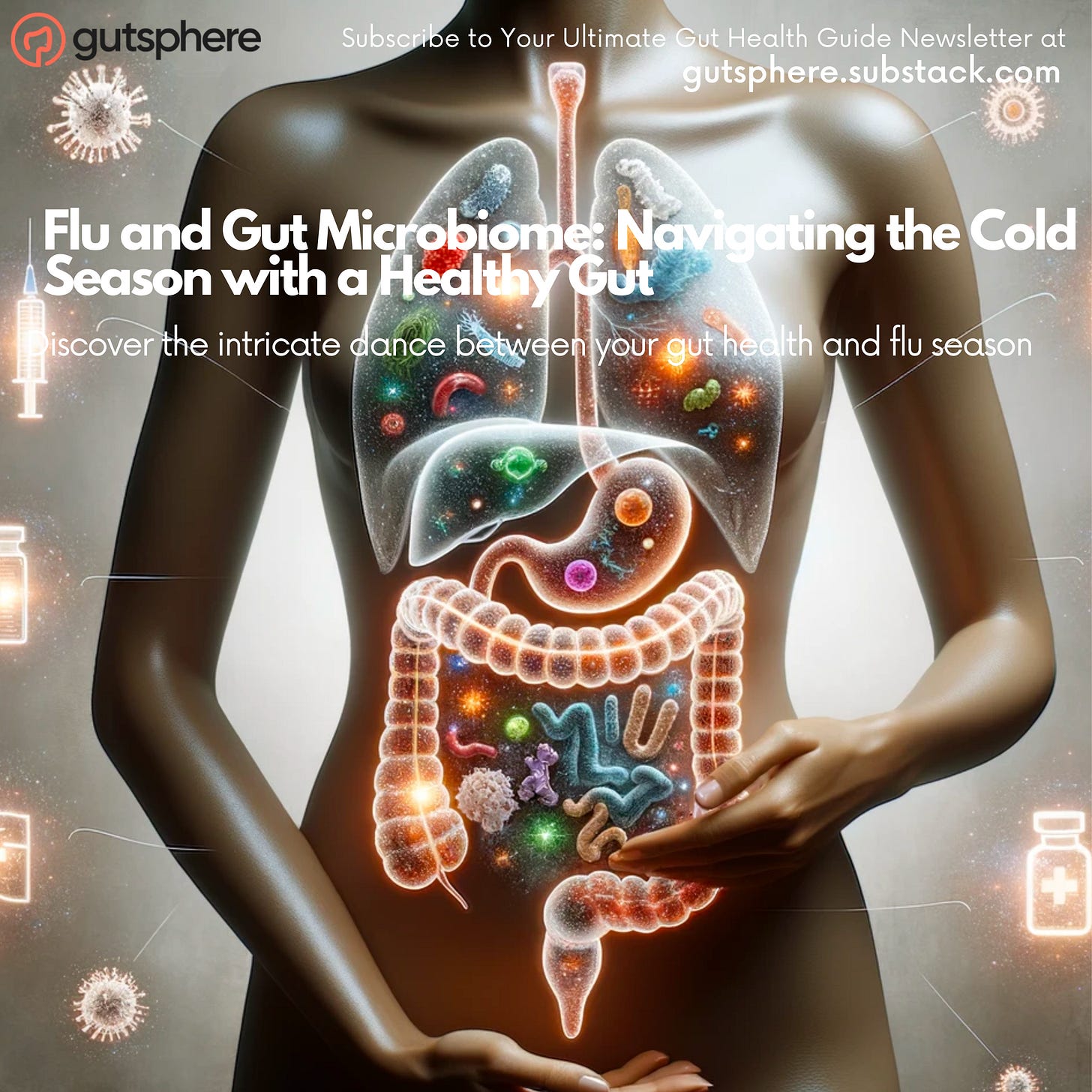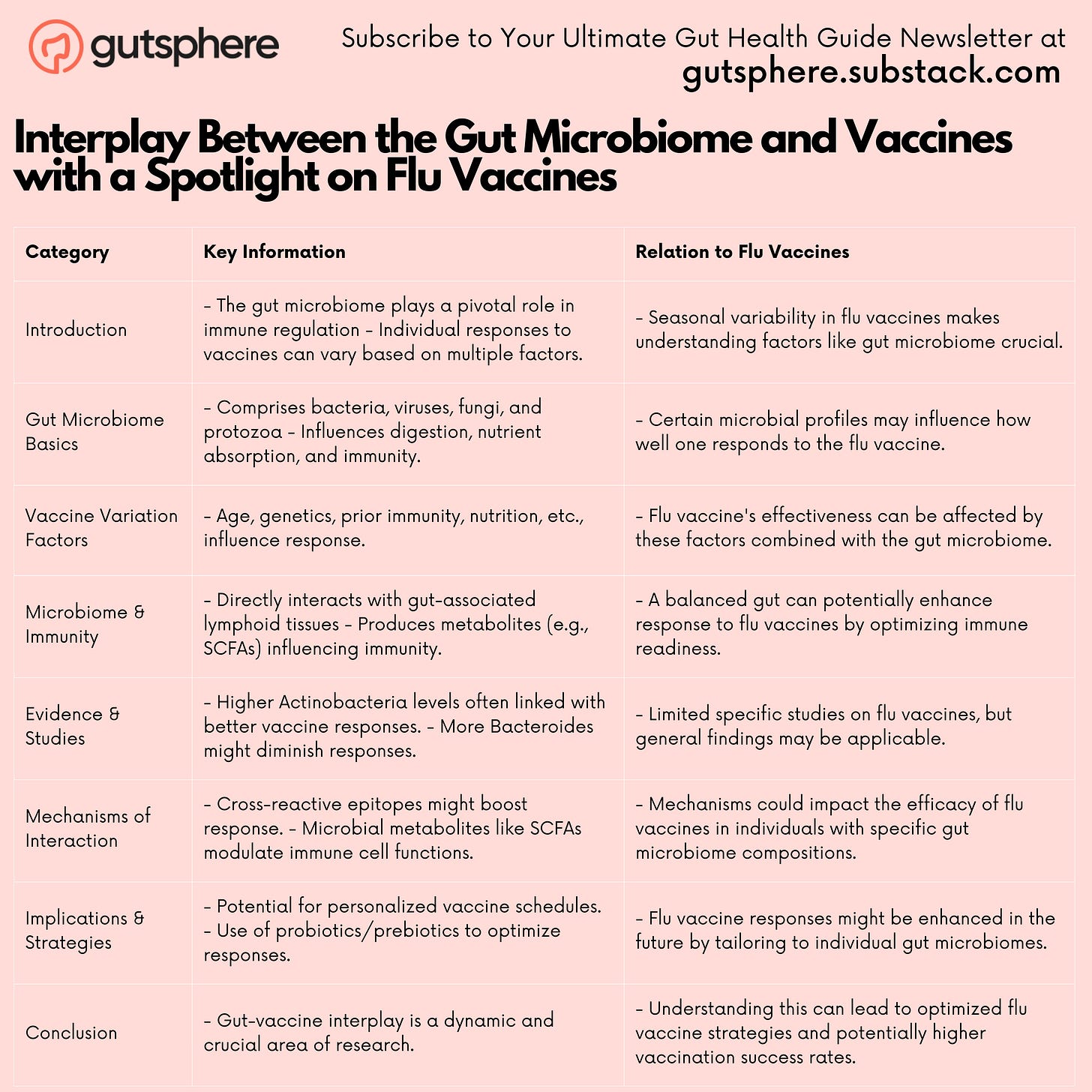Flu Vaccines & Our Gut: A Two-Way Street
Intriguing interplay between flu vaccines and the trillions of microbes in our intestines.
Hi Gutsphere Community,
Since our birth, we receive a multitude of vaccines. But have we ever pondered their impact on our gut microbiome or the role our gut plays in modulating the vaccine's effects? This is especially pertinent when considering the annual flu vaccine we're advised to take. How should we evaluate risks and rewards for taking vaccines? We aim to delve into these questions to provide clarity.
Before we delve into the intricate relationship between flu vaccines and our gut, it's important to lay down a foundation of understanding about vaccines themselves.
What is a Vaccine?
A vaccine is a biological preparation that helps the body's immune system recognize and fight specific viruses or bacteria. They often contain small amounts of weakened or killed germs that can cause diseases. By introducing these to the body, the immune system is stimulated to recognize the invader and become better equipped to fight off the disease if it encounters the full-strength pathogen in the future.
Types of Vaccines:
Live-attenuated vaccines: Made from a pathogen that is weakened so that it cannot cause disease under normal circumstances.
Inactivated vaccines: Made from pathogens that have been killed or inactivated, so they cannot cause disease.
Subunit, recombinant, or conjugate vaccines: These are made from pieces of the pathogen, often its protein.
Toxoid vaccines: These are used for bacterial diseases that are caused by toxins produced by the bacteria. The toxins are inactivated to make the vaccine.
mRNA and DNA vaccines: A newer approach, these vaccines provide our cells with genetic instructions to produce a piece of the pathogen, typically a protein, to stimulate an immune response.
Vaccine Timeline Snapshot
History of Vaccines gives a fascinating timeline for vaccine key milestones in vaccine development.
After familiarizing ourselves with the basics of vaccines, we now deep dive into the symbiotic relationship between vaccines (focusing on flu vaccines) and the intricate ecosystem within our gut. The gut's microbiome plays a pivotal role not just in digestion but also in our overall immunity. Let's uncover this intricate interplay and its significance.
Interplay Between the Gut Microbiome and Vaccines: Spotlight on Flu Vaccines
Introduction to the Gut Microbiome and Its Immune Influence
Our gut houses a staggering multitude of microbes, often termed our 'second genome.' These microbial denizens don't merely assist in digestion; they wield profound influence over our overall immunity, impacting everything from intestinal immunity and metabolism to allergic inflammation.
Gut Microbiome and Its Influence on Immune Responses
Direct Interactions: The microbiome directly interacts with gut-associated lymphoid tissues, crucial sites for immune cell development and maturation.
Metabolite Production: The gut microbiome produces bioactive metabolites like short-chain fatty acids (SCFAs) that have systemic effects, including modulation of immune cell function and response.
Barrier Maintenance: A healthy microbiome reinforces the gut barrier, preventing translocation of pathogens and unwanted immune activation.
Vaccine Efficacy and Its Natural Variation
Vaccines have historically been one of the most potent tools in combating infectious diseases. However, individuals do not respond uniformly. Factors such as age, genetic makeup, prior immunity, nutritional status, and underlying health conditions can significantly influence vaccine efficacy. Emerging research suggests that the gut microbiome may be another critical player in this variability.
Microbiota's Role in Vaccine Responsiveness:
The Broad Picture: The gut microbiota's role in determining vaccine responsiveness is increasingly evident. Two crucial members, Bifidobacterium and Bacteroides, can sway immunity and individual vaccine responses. Factors like birth method (C-section versus natural), infant feeding choices (formula versus breast milk), and early antibiotic exposure can significantly influence these genera's presence.
Special Mention - Flu Vaccines: Recent findings suggest a nuanced relationship between the gut microbiota and the efficacy of influenza vaccines. Individuals administered broad-spectrum antibiotics prior to receiving the flu shot demonstrated lowered H1N1-specific neutralization and reduced IgG1 and IgA binding antibody titers. The depth of this relationship is further underscored by evidence of impaired antibody responses in antibiotic-treated and germ-free mice.
Source: The immunological interplay between vaccination and the intestinal microbiota
Mechanisms of Interaction
Several proposed mechanisms underpin the gut microbiome's influence on vaccine responses:
Cross-reactive Epitopes: Shared structures between microbes and vaccine components can lead to enhanced immune activation.
Modulation through Metabolites: SCFAs and other microbial metabolites can directly influence the function and differentiation of B and T cells, thus shaping the vaccine response.
Microbial Adjuvants: Some microbial components can boost vaccine efficacy by acting as natural adjuvants, enhancing the body's immune response.
Microbiome Modulation for Enhanced Vaccine Efficacy:
Harnessing the immunomodulatory capacities of health-promoting bacteria genera offers promise for elevating vaccine efficacy. Bifidobacterium, recognized as generally safe, stands at the forefront of potential microbiome-based interventions. Bacterial extracellular vesicles (BEVs) from specific strains are especially promising. With successful precedents like the BEV vaccine against cholera and meningitis type B, there's hope for harnessing BEVs from commensals like Bifidobacterium for future potent adjuvants.
Source: The immunological interplay between vaccination and the intestinal microbiota
COVID-19 Vaccines and the Microbiome Bidirectional Influence:
Microbiome Impact on Vaccine Efficacy: Recent research underscores the gut microbiota's potential modulation of COVID-19 vaccine efficacy. Disruptions in the microbial balance might influence both the safety and effectiveness of these vaccines.
Vaccine Impact on the Microbiome: Interestingly, this relationship isn't unidirectional. COVID-19 vaccines might also alter gut microbiota diversity, with potential ramifications for overall gut health.
Source: Interaction between gut microbiota and COVID-19 and its vaccines
A Closer Look at SARS-CoV-2 Vaccination and IBD Patients:
General Overview: SARS-CoV-2 vaccination, though paramount for global health, sees variability in efficacy, especially amongst immunosuppressed groups. IBD patients on anti-TNF therapy are a prime example, showcasing attenuated serological responses post-vaccination.
Gut Microbiota as a Potential Influencer: The intricacies of IBD bring about disturbances in the gut microbiota. The triadic relationship between IBD, the gut microbiota, and immunosuppressive therapies raises intriguing questions about how these dynamics influence immune responses to SARS-CoV-2 vaccination.
Implications and Future Strategies
Understanding the gut-vaccine interplay offers numerous opportunities:
Personalized Vaccination: Gut microbiome analysis might help predict individual vaccine responses, allowing for personalized vaccine schedules or adjuvant use.
Probiotics and Prebiotics: Modifying the gut microbiota through these supplements might prime the immune system for better vaccine responses.
Synbiotics and Fecal Transplants: These interventions can offer a more comprehensive approach to optimizing the gut microbiome for improved vaccine efficacy.
To Vaccinate or Not? Evaluating Risks & Rewards:
Taking the flu vaccine yearly is a personal decision. However, understanding its benefits, not only in preventing flu but potentially in modulating our gut health, provides added incentive. It's crucial to remember that:
The risks of flu-related complications far outweigh the minor side effects of the vaccine.
A healthy gut may boost the vaccine's effectiveness, offering better protection against the flu.
Consultation with healthcare professionals can provide personalized advice based on individual health profiles.
Conclusion
The intricate dance between vaccines and our gut microbiome underscores the holistic nature of our health. As we continue to discover the depths of this relationship, it's clear that attending to our gut health can enhance the protective shield vaccines provide. As the saying goes, "It takes two to tango," and in the realm of health, the dance between our gut and vaccines might be one of the most consequential.
Next: Flu Medications & Microbiome: Balancing Act
Request
Share
Our sincere request to you is to share the newsletter with your friends, family, and community so that they can benefit from the content. Also it will help us grow the newsletter, and eventually, as we release more content, digital tools, and more we will enable people around the world to live chronic disease free.
Subscribe
Feedback
Also, please give us feedback so that we can improve the content. And if there are any topics that you want us to cover please send us your questions and topics. Furthermore, if you try any of the things we provided information please share your experience with us.
Thank You
GutSphere Team
Disclaimer
Please note that the information provided in this newsletter is for informational purposes only and should not be considered as a substitute for professional medical advice, diagnosis, or treatment. If you have any concerns or questions about our health, please consult with a licensed healthcare professional. The information contained in this newsletter is not intended to diagnose, treat, cure, or prevent any disease. The publisher and authors of this newsletter assume no responsibility for any adverse effects that may result from the use of the information contained herein.



